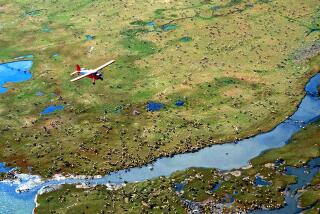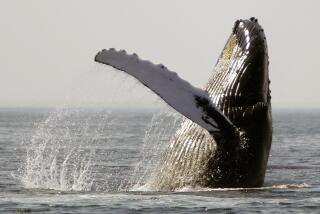Alaska Eskimos Fear Oil Activities May Harm Whale Hunt : Ecology: Natives, who have held onto traditional activities despite newfound wealth, fear that exploration at sea may alter migration patterns.
BARROW, Alaska — Oil has helped bring Alaska’s Inupiat Eskimos into the modern world, but they fear it may harm the bowhead whales at the center of their ancient culture.
Since oil was discovered in Prudhoe Bay in 1968 it has brought a bonanza of untold riches to this village on the edge of the Arctic Ocean, turning the North Slope Borough into one of the wealthiest per capita local districts in the country.
But natives, who have held onto traditional subsistence activities despite their sudden material wealth, fear that exploration at sea may divert the migration of the whales they have hunted for millennia.
“The whales have been here for thousands of years and we have been here for thousands of years in one of the harshest environments on Earth,” said Edward Itta, president of the 43-member Barrow Whaling Captains Assn.
The primordial synergy between the hunter and the hunted and the artificial harmony of Arctic populations with oil riches, which largely fund the communities, was disrupted with the drilling of an exploratory well last fall.
Arco Alaska Inc., drilling at its Kuvlum 1 site 15 miles offshore in the Beaufort Sea and 60 miles east of the giant oil field at Prudhoe Bay, struck an unusually high grade of oil about 8,500 feet below the ocean floor.
Oil industry executives have said that the find, which Arco shares with five partners, would have to contain at least 1 billion barrels of recoverable crude to be economically feasible--about one-twelfth the size of Prudhoe Bay.
Arco is eager to return when ice breaks up this month to retest what lies beneath the Beaufort Sea to determine whether the amount of oil would merit production in the Arctic outer continental shelf--which would be unprecedented.
Arco and the whalers are on a collision course.
Irate at evidence that last year’s drilling disrupted the bowhead whale’s migratory path, and concerned that an oil spill in the Arctic could destroy the whale population forever, Inupiat Eskimos oppose further drilling and seismic exploration of Kuvlum.
Whaling captains complained that the exploration activity has scared the whales, which are protected by the Endangered Species Act and Marine Mammal Protection Acts, driving them further offshore and making them especially skittish as they migrate west, then south past Point Barrow.
“Not one bowhead whale got within 20 miles of the drilling rig and the icebreakers,” said Ron Morris, field service officer at the National Marine Fisheries Service in Anchorage.
Whalers from the town of Nuiqsut, west of Prudhoe Bay, had to travel a minimum of 35 miles to intercept the whales and even then they said the whales behaved as if they were spooked.
Whalers, who retain an aboriginal right to take a fixed quota of whales each year, backed a resolution of the North Slope Borough in early July seeking to block exploratory activities during the fall hunt.
Leaders of the borough--a community of fewer than 6,000 residents in an area the size of Minnesota atop Alaska’s enormous land mass--are girding for an ugly battle with the industry that made them rich.
“We’re going to come to a confrontation before too long if they keep on making finds out there, because this is the fiber of our culture,” said Oliver Leavitt, president of the North Slope Borough Assembly and himself a whaling captain.
Arco acknowledges that whale migrations were diverted by the drilling activity last year, but the company appears determined to proceed whether or not it gets an accord.
“We committed to curtail our seismic program, if necessary, to avoid any adverse impact on the subsistence hunt,” said Arco spokesman Ronnie Chappell. “We are optimistic that we will be able to negotiate an agreement and conduct our seismic activity without any adverse impact on the hunt later this year.”
The borough has appealed to the National Marine Fisheries Service to deny Arco a “letter of authorization” required to operate exploratory activities at night or in fog and to allow its operations to bother whales and other marine mammals.
“We’re not allowed to have any unmitigable activities that could affect the subsistence hunt,” Morris said.
Nevertheless, Arco, which only has about a two-month period when the sea is ice-free and therefore best for exploration, appears prepared to proceed even without an agreement.
“We clearly intend . . . to engage in a cooperative agreement with them (whalers), or in the absence of that agreement to voluntarily live up to the kind of terms” Arco believes will protect the whales, said Arco official Bob Griffeth.
A spill the size of the 1989 Exxon Valdez disaster 1,000 miles to the south, might linger for decades in the Arctic, where gyrating ice would capture and spread it, experts say.
Skeptics believe the controversy over exploration in Arctic waters could bolster efforts to open production in the Arctic National Wildlife Refuge, or ANWR, a plain south of Kuvlum whose lush environment often serves as a caribou calving ground.
“Up here we would like to see the opening up of ANWR, where it’s safe,” Leavitt said. But this view is strongly opposed by Athabascan Indians living to the south who depend on the caribou.
Given the choice, Inupiat Eskimo leaders say their hearts and spirits lie with their cultural heritage.
“We realize that we’re in the middle of two worlds here,” said Itta, the whaling captain. “And we know that this oil is a temporary thing. When it’s all gone, we’re still going to be here, and we want the whales to be here too.”
More to Read
Sign up for Essential California
The most important California stories and recommendations in your inbox every morning.
You may occasionally receive promotional content from the Los Angeles Times.










